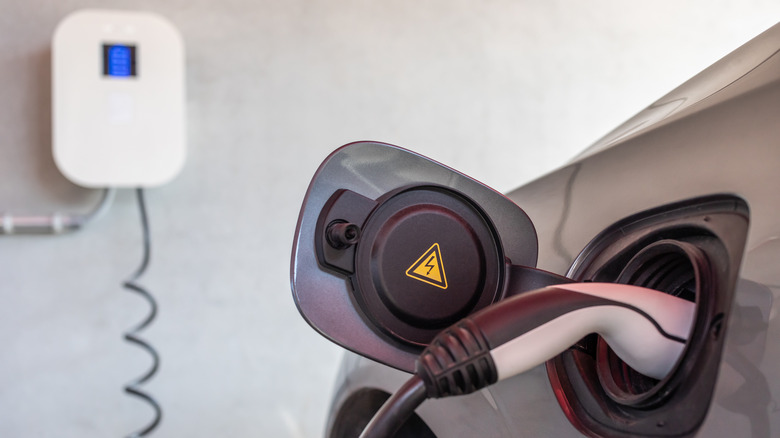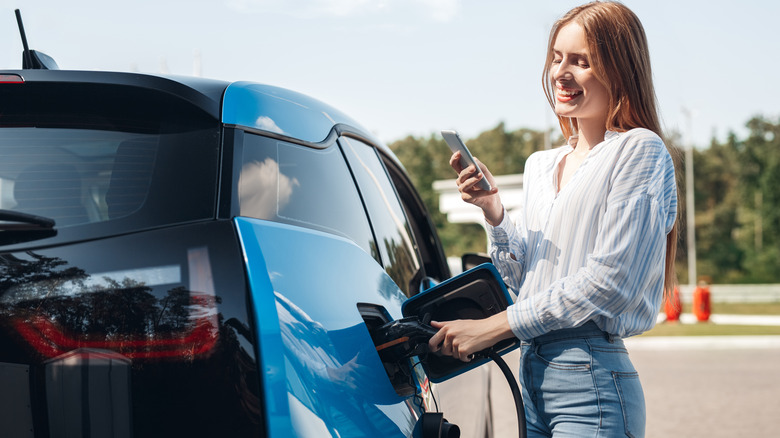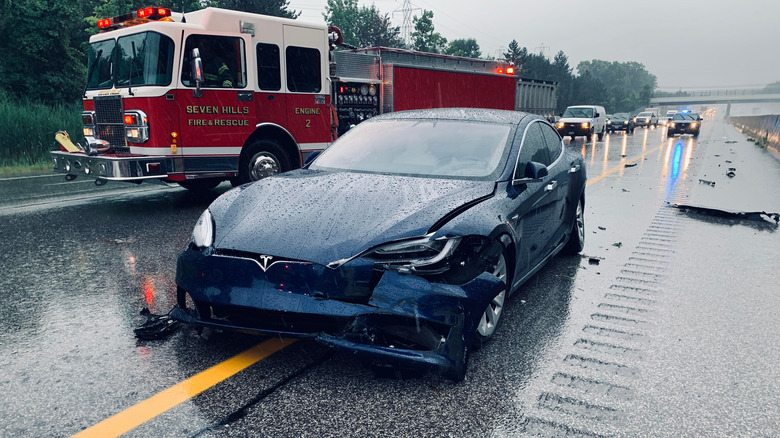How Much Do Electric Vehicles Actually Cost To Maintain?
By 2040, brand-new gasoline vehicles won't be sold in most countries if everything goes according to plan. Some U.S. states such as Virginia, New York, Oregon, California, and Massachusetts are committed to a 2035 deadline to phase out gasoline vehicles and replace them with electric vehicles. Even major auto manufacturers like Ford, Honda, General Motors, and Volkswagen don't want to get left behind as the world is shifting towards sustainable energy.
However, even though electric vehicles don't emit gas pollutants, they still need to be maintained. More succinctly, you need to recharge your EV and service it when the need arises. In addition to that, the battery of an electric vehicle doesn't last forever — if it degrades, you need to replace it. Insurance is another maintenance cost that you need to consider before buying an EV, or else it could cost you an arm and a leg in case of an accident. But what's the ballpark figure it will cost you to maintain an electric vehicle? Let's find out.
Fueling an electric vehicle is cheaper than a gasoline car
According to a report by Consumer Reports, fueling an electric vehicle is cheaper than a gasoline car by 60% — if you calculate the average cost of fuel in all the U.S. states. In fact, the average annual cost to charge an electric car in the U.S. is less than $500, while you could spend twice as much to fuel a gasoline vehicle. Of course, your EV fuel cost depends on the electricity tariff of your state. For instance, the average cost of electricity in Hawaii is 30 cents per Kilowatt, but if you're in Washington or Texas, it could cost you less than 10 cents per Kilowatt.
Moreover, if you charge your electric vehicle during off-peak hours, you could significantly reduce your fuel cost. But to do that, you need to install an EV charger at home. A level 2 EV charger for your home could cost you between $800 to $2,000 — and probably an extra $800 to $2,000 to install. However, the Inflation Reduction Act offers a tax incentive of up to $1,000 if you're buying or installing a home EV charger. Not to forget, some automakers have partnered with Electrify America to offer free charging if you're driving specific EV models.
Electric vehicles are cheaper than gasoline vehicles to maintain
Because electric cars don't have an engine, you don't need to worry about changing the spark plugs, oil, timing belt, or fuel filter. This means that electric vehicles are cheaper to maintain than gasoline vehicles. The research paper published by Consumer Reports concludes that you're likely to spend 50% less on maintaining an electric vehicle compared to a gasoline vehicle. The data was compiled after feedback from hundreds of thousands of EV owners, and the average cost to maintain an electric vehicle over the course of 200,000 miles was $4,600 — this is half the maintenance cost of a gasoline vehicle.
Besides that, how much you spend on insurance is another factor that you need to consider. In most cases, you will pay higher insurance premiums for an electric vehicle compared to a gasoline vehicle. For instance, it could be more expensive for Tesla Model 3 owners to insure their vehicle compared to comparable gas-powered cars. Edmunds estimates that the insurance cost for a Tesla Model 3 after 5 years is $7,326 on average — if you're driving a Chevrolet Bolt, it could cost you $4,777 over the same period.
Electric vehicles are more expensive than gasoline vehicles to repair
Although electric vehicles are cheaper to fuel and maintain, they're more expensive than internal combustion vehicles (ICE) to repair. To put it into perspective, if you own a Tesla, the repair cost will be 27% more than the average car. But it's not just Tesla models, as most electric vehicles are more expensive to repair — if you drive a luxury electric vehicle SUV, it could be 53% more costly to repair (via Forbes). That's why it will cost you more to insure an electric vehicle than a gasoline vehicle.
The battery is the most expensive component to replace since it's usually 30% to 40% of your electric car's value. A battery replacement on a Tesla Model S can cost up to $22,600 — give or take a few hundred dollars. Even if you buy the cheapest electric car, the Nissan Leaf, it could cost you up to $9,500 to replace the battery — according to Recurrent Auto.
On the other hand, the repair cost of electric vehicles with body damage could cost thousands of dollars — sometimes up to $20,000 after a minor accident. However, the repair cost of your electric vehicle shouldn't be a concern if you're covered by insurance. Also, the battery packs of the new electric vehicles are built to last between 300k to 500k miles before a replacement is necessary. Not to mention, most EV manufacturers in the U.S. have a battery warranty of up to 100,000 miles.



